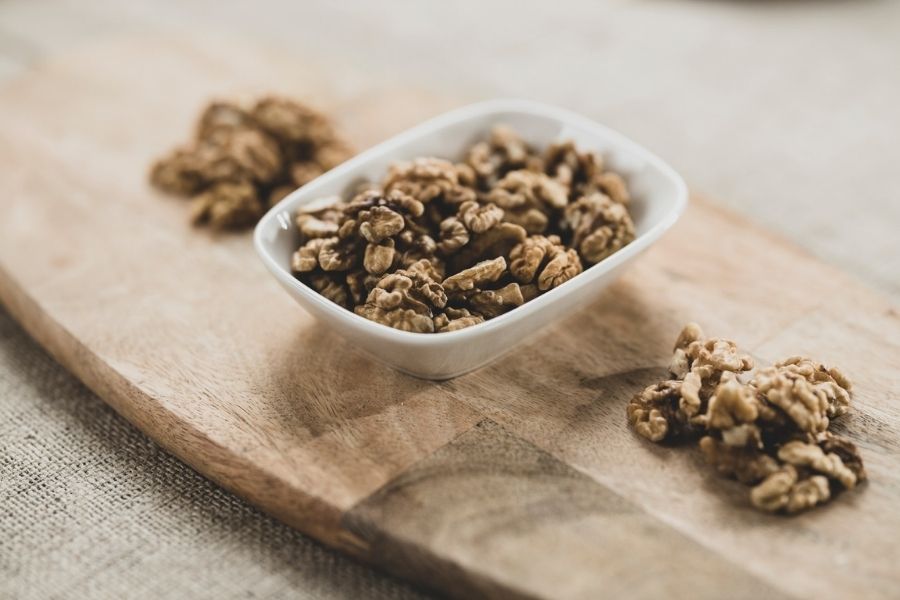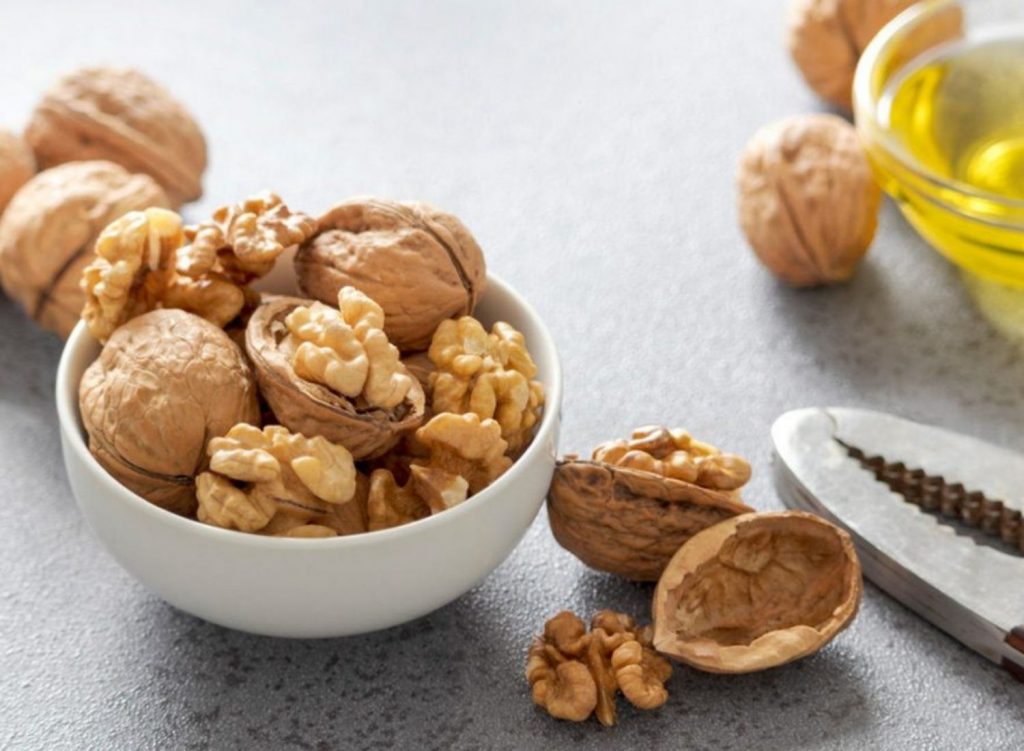Walnuts are edible seeds extracted from the Juglans genus trees, which originated in the Mediterranean and Central Asia. They have always have been a part of the human diet. Walnuts have a delicious taste and crunchy texture. Here are twelve health benefits of walnuts approved by Nutritionists and Dietitians.
Uses Of Walnuts

Walnuts are used in various dessert items. Baked goods like cookies, energy bars, cakes, granola, cereals, banana walnut bread, and my favorite walnut brownies! Dr. Vinson states that 7 walnuts a day can give your body its health benefits. A handful of walnuts contains almost twice as much antioxidants as an equivalent amount of any other commonly consumed nuts. It is said that walnuts rank above peanuts, almonds, pecans, pistachios, and other nuts.
Recommendations per day: 5 to 7 walnut halves (or 2 tablespoons pieces)
Nutritional Value Of Walnuts
1. Vitamins In Walnuts
Walnuts are excellent sources of vitamins. They have vitamin C, vitamin E, and B vitamins (vitamin B6, riboflavin, niacin, thiamine, pantothenic acid, and folate). These vitamins maintain the proper functioning of the body.
2. Minerals In Walnuts
The major mineral ingredient present in walnuts is copper, promoting heart health and maintaining bone, nerve, and immune system. Other important minerals found in walnuts are –
- Potassium
- Manganese
- Calcium
- Magnesium
- Iron
- Phosphorus
- Sodium
- Zinc
3. Plant-based Chemicals In Walnuts
Walnuts are also rich in certain phytochemicals (plant-based chemicals). Phytic acid acts as a beneficial antioxidant. Ellagic acid reduces heart disease and cancer risks. Melatonin is naturally found in walnuts. It helps regulate your body clock and reduces your risk of heart disease with its antioxidant properties. Catechin is a flavonoid antioxidant that may have various health benefits, including promoting heart health. Walnuts are a rich source of alpha-linolenic acid (plant-based omega 3 fatty acid).
How Does Walnuts Affect Our Body?

1. Antioxidant Property
Walnuts are superbly rich in antioxidants, which are mainly concentrated in the brown skin. Walnuts ranked second in a study investigating the antioxidant content of 1000 foods commonly eaten in the United States.
2. Fat Content
Walnuts contain high amounts of polyunsaturated fats (PUFAS). PUFA is beneficial for brain health and its function. Walnuts have relatively high omega 3 fatty acids called alpha-linolenic acid (ALA) and linoleic acid. Omega 3 fatty acid plays a part in helping to improve brain signaling.
3. Reduce Inflammation
The polyphenolic compounds found in walnuts reduce the effects of inflammation in the body, which benefits cardiovascular and oncology health.
Health Benefits Of Walnuts
Let’s not forget the health benefits of walnuts to our body.
1. Walnuts Help Treat Diabetes

Diabetes is one of the prevalent health problems faced by many. People with diabetes may have walnuts regularly. They contain many polyunsaturated and monounsaturated fats. So, it is always better to eat this nut in moderation.
2. Walnuts Cleanse Digestive System
Walnuts clean the internal digestive tract, helping in detoxification by removing toxins and waste. It cures constipation too. An associate professor at the Louisiana State University in the United States said in her research that walnuts help the gut and have good probiotic properties. Eating walnuts regularly will increase lactobacillus and roseburia, which improved gut function.
3. Walnuts Improve Fertility In Males
A study published in the Journal of Biology of Reproduction at the University of California said that walnuts have a good effect on male fertility. It helps by improving sperm quality, quantity, vitality, and motility.
4. Walnuts Lower Bad Cholesterol And Improve Good Cholesterol

A study suggested that walnuts are good choices for daily consumption. A survey of 365 participants in 13 trials found that diets enriched with walnuts led to lower total cholesterol (TC) and LDL (bad cholesterol) than other diets. The latest analysis combined data from 26 previous trials of more than 1,000 people; compared with those on a regular diet, Study who was consuming a walnut-enriched diet had
- a lower triglycerides level
- a lower level of apoprotein B, which is a protein linked to cardiovascular disease
- total cholesterol level has reduced too.
- LDL cholesterol level was also found low.
5. Cardiovascular Health

Walnuts are made up of a good amount of protein and polyunsaturated fat. According to the Institute of Medicine, an adequate intake of alpha-linolenic acid (polyunsaturated fat omega 3) is 1.6 g/day and 1.1 g/day for men and women, respectively.
Do you know that a single serving of walnuts meets that guideline? Studies have shown that each gram of ALA you eat per day lowers your risk of dying from heart disease by at least 10%.
6. Cancer Prevention

Walnuts are rich in the polyphenol ellagitannins. Few gut microbes can convert these to urolithins, which are compounds that have anti-inflammatory properties in your gut. It can help protect against colorectal cancer. Its anti-inflammatory actions could help protect against other cancers too.
7. Walnuts Help In Pregnancy

Pregnant women can eat walnuts in their diets. The rich source of vitamin B-complex present in roasted unsalted walnuts is essential for fetal growth. Omega 3 fatty acid improves brain health by reducing oxidative stress. Therefore, eating walnuts during pregnancy help protect fetus’s brain.
8. Walnuts Regulate Sleep

Proper sleep is important to regulate the effective functioning of the body. Every person must get 7-8 hrs of it. Walnuts work as a sleep-promoting food. Melatonin is present in the bio-available form in these nuts. Walnuts have melatonin, a hormone that helps induce and regulate sleep. Omega 3 fatty acid also contributes to proper sleep.
9. Walnuts Are Mood Booster

Insufficient amounts of omega-3 fatty acids may cause hyperactivity, tantrums. Supplementing a child’s diet with these nuts compensates the deficit in EFAs (essential fatty acids) may help alleviate their mood. Walnuts are one of the foods that help battle depression and stress after trauma.
10. Walnuts Are Used In Skin Care

Walnuts have beautifying properties. The vitamin E in walnuts helps in protecting the skin from harmful free radicals. It helps in preventing dry skin. Walnuts scrubs help prevent acne scars on the face. Walnuts can reduce skin inflammation and help retain nutrients to the skin.
11. Walnuts Boost Immunity

Stronger immunity is synonymous with the healthy functioning of the body, which fights infections and health ailments. Regular consumption of walnuts helps build a strong immune system, which can prevent the onset of various diseases—the rich source of antioxidants responsible for this benefit. Antioxidants destroy free radicals in the body that are responsible for diseases.
12. Walnuts Help With High Blood Pressure

High blood pressure is a major risk factor for heart disease and stroke. Few studies suggest that eating walnuts may help lower blood pressure in people with high blood pressure. Walnuts contain omega 3 fatty acids and alpha linoleic acid that positively affects blood pressure, controlling it.







